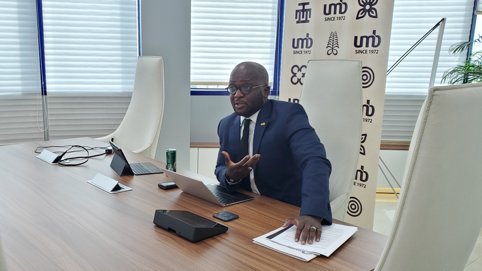African SMEs will be able to rapidly achieve international standards with digitisation, enabling them to compete on and access international markets, Nana Dwemoh Benneh, CEO of the Universal Merchant Bank (UMB), has said.
Mr. Benneh made these comments in a presentation at the 4th Strategic Leaders’ Summit 2022 held in Kampala, Uganda. The summit largely deliberated on how African start-ups and SMEs in the African Continental Free Trade Area (AfCFTA) era can innovate, digitalise and transform to become global players – with a specific panel discussion on how banks can help African SMEs access funding.
According to the World Bank and other think-tanks, SMEs account for over 70 percent of economic activity in sub-Saharan Africa (SSA). A key trend in the development of SMEs worldwide is the increasing trend of enterprises operating in or powered by what the World Economic Forum has termed the 4th Industrial Revolution, largely driven by four specific technological developments that are: big data analytics, AI and automation, cloud technology and high-speed mobile Internet. UMB presented a uniquely indigenous African banking view of the challenge.
Nana Dwemoh Benneh, presenting for the bank noted: “Digitisation represents perhaps the biggest all-encompassing game-changer for African SMEs in a generation. We know harnessing technology allows SMEs to leapfrog, leading to economic development. We saw this happen with the Asian economies in the last century. We estimate that a similar effect can be achieved with digitisation. Digitisation is allowing African SMEs to accelerate their adoption of quality-control standards and speed up their routes-to-market.
“In finance, digitisation allows banks to solve challenges that hampered extending funding to SMEs, especially as regards data. Digitisation allows us to access data which improve the credit process; for instance, allowing us to extend the right credit to customers due to an enhanced KYC regime. At UMB, for instance, we are pioneering using digital inventory systems as the basis for an inventory-backed credit line for SMEs here in Ghana.”
In further comments during the panel, Nana Dwemoh Benneh noted: “UMB’s analysis supports the view that one of the most viable start-up ecosystems for the Ghanaian and African economy is the technology/fintech ecosystem. The evidence from markets like Nigeria – where start-ups like OPAY and Flutterwave have raised over US$200million in less than four years – makes the point. We believe banks collaborating with fintech will be beneficial to SMEs, as the fintech companies are delivering innovation of financial products to the SME sector”.
On the panel with Nana Dwemoh Benneh were Eric Osiakwan, Managing Partner-Chanzo Capital; Peace Ayebazibwe Kabunga, Executive Director-HFB; Patricia Omallah, Head Legal & Compliance-Ecobank; Michael Mukasa, Chief Commercial Officer-Roke Telkom; and Badru Ntege, Director/co-owner-NFT Consult. The 4th Strategic Leaders’ Summit 2022 is an initiative of the Human Capital International in partnership with Shared Value Africa Initiative.
Universal Merchant Bank (UMB) is a full-service financial institution specialising in customised banking products and services. UMB opened on March 15, 1972 and is a leading Ghanaian indigenous bank with considerable financial expertise. UMB is recognised for its entrepreneurial approach, innovative use of technology and distinctive banking solutions. UMB currently has thirty-six (36) branches, three (3) UMB Centres for Businesses, one (1) UMB PPP Incubator Centre and a vast network of ATMs. UMB is also ISO 27001 and PCI DSS certified.
Human Capital International design and deliver cutting-edge training solutions to help employers, employees, SME operators and Faith-based institutions to consistently innovate and use every possible capacity development technique and technology to push the boundaries farther and succeed beyond every perceived limitation.
The Shared Value Africa Initiative (SVAI) is a pan-African organisation and regional partner of the global Shared Value Initiative business network which are drawn together through a common purpose: to assist and collaborate with organisations to create Shared Value and build prosperous and sustainable economies and societies through focusing on Profit with Purpose.
There is a real need for African-driven solutions for African challenges. Adopting a Shared Value business model enables innovative, forward-thinking business to find growth opportunities in addressing social and environmental challenges using the UN Sustainable Development Goals as their guiding principles.










